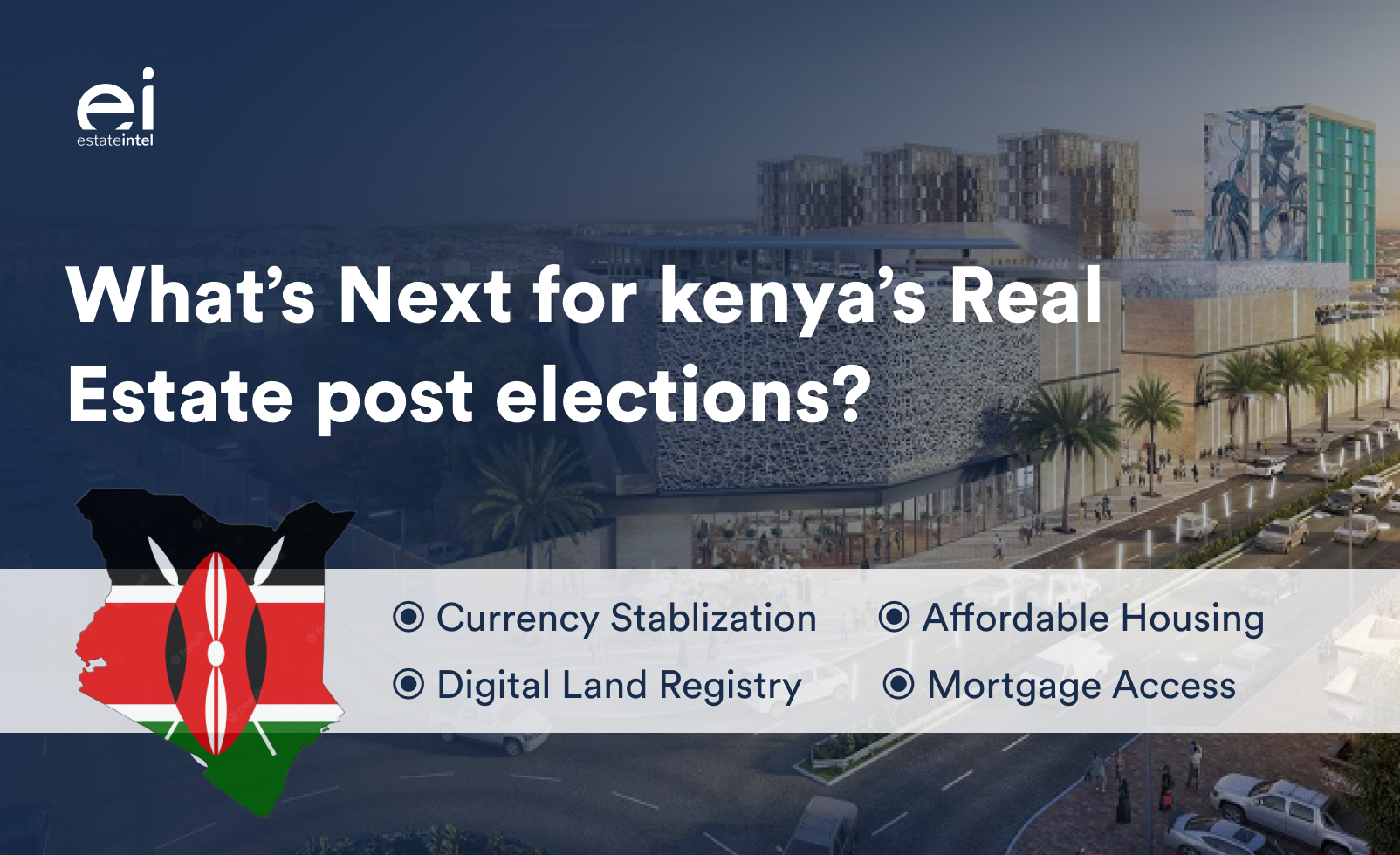What next for Kenya's real estate market post elections?
Tilda Mwai . 3 years ago

Share this post
Subscribe to our newsletter
Article Summary: After a prolonged period of election uncertainty, Kenya Kwanza’s candidate William Ruto was declared the winner on Monday 15th August 2022 . Although the election results have been disputed, the country is slowly returning back to normal. And against this backdrop, real estate market activity is expected to bounce back as well. Generally, the real…
After a prolonged period of election uncertainty, Kenya Kwanza’s candidate William Ruto was declared the winner on Monday 15th August 2022 . Although the election results have been disputed, the country is slowly returning back to normal. And against this backdrop, real estate market activity is expected to bounce back as well.
Generally, the real estate sector saw a relatively bullish return to market activity in the first quarter of the year. However, with rising inflation due to the Russia-Ukraine war and election related uncertainty, a general slowdown was observed in the market as occupiers opted for a ‘wait and see’ approach. Development activity also slowed down as a result of the currency fluctuation and increased cost of construction materials such as cement.
Following the election, we expect varied performance across the market underpinned by a number of factors that will be critical to the real estate market over the coming months, some of which are highlighted below.
Currency Stabilization will be key to ensuring a stable market.
The Kenyan Shilling has continued to depreciate against the dollar over the past few months to exchange at KSh 119.47 per US dollar as at August 18,compared to KSh 113.13 recorded in December 2021. While this might have contributed to the spike in demand for prime residences by foreign buyers, continued depreciation is likely to impact on market supply with developers putting on hold upcoming developments due to the increased cost of access to imports as well as potential challenges in the repatriation of profits in the unlikely event of dollar shortages.
As a result, this limited supply could lead to a hike in prices generally impacting on affordability.
As such, the ability to stabilize the Kenyan currency and prevent further depreciation will be key in ensuring positive market performance.
The adoption of a unified Act will cement the outgoing Government’s Affordable Housing Legacy
Affordable housing has been a core area of focus for the outgoing government with over 150,000 units of both private and public sector developments contributing to one of the largest sector development pipelines in the real estate market.
However, the absence of an Affordable Housing Act means that the majority of development incentives provided were pegged to the government of the day rather than a general public requirement. As such, the ability to continuously meet Nairobi’s affordable housing deficit, currently estimated to grow by 200,000 units per annum, will be dependent on the adoption of an Affordable Housing Act. So far, institutions such as the Housing Finance Development and Investment are already lobbying for the adoption of a single Affordable Housing Act noting that it will help ensure there are no bottlenecks for financial institutions, developers, borrowers and buyers.
Land registry digitization needs to be implemented sooner rather than later
The adoption of Kenya’s online land registry Ardhi Sasa, was set to streamline land transactions by curbing various malpractices ranging from fraud, corruption to missing files that have historically plagued land registries in Kenya.
However, a year since its adoption, the platform is still not fully operational resulting in significant delays and confusion in land transactions in Nairobi, where it was first rolled out, impacting on the market performance. For example, according to the Law Society of Kenya, very few transactions had been executed since its launch, with the Kenya Bankers Association further noting that these delays had put on hold transactions worth over KES 102 billion as at Q1:2022.
Easing financial burdens will enhance market access
A key barrier to the market has been access to capital for both individuals and corporate institutions. For potential individual investors, this has meant that the high cost of capital has limited residential mortgage takeup. According to the Central Bank of Kenya, the average mortgage size is estimated at Ksh. 8.6 million, with the average interest rate charged at 10.9% and the average repayment period being 11.2 years resulting in general lack of affordability by the majority of the population.
While institutions such as the Kenya Mortgage Refinancing Company have been promulgated, to conduct mortgage refinancing, its full impact is yet to be felt in the largely informal market. Interestingly, ensuring mortgage access was a key promise for the potential incoming government. In their manifesto, Kenya Kwanza promised to grow the number of mortgages from 30,000 to 1,000,000 by enabling low cost mortgages of Sh10,000 and below. While this may not be a short term goal, the Government’s prioritization of this initiative could very well be an indicator of expected progress in the days to come.
We love your feedback! Let us know your outlook on Kenya’s real estate market by sending an email to [email protected].
If you would like to view a more in-depth analysis of the Nairobi real estate market, subscribe to Estate Intel’s platform to access data such as; sales rates, yields, supply drivers, and information on key real estate market participants who are active in the market.
Related News
You will find these interesting

Bisi Adedun . October 2023
How Jabi Lake Area is Developing into a Prime Residential Location
Jabi is an area located within the phase 2 vicinity of the Abuja Municipality, known for housing the iconic Jabi Lake. I...
abuja
Jabi Lake

Tilda Mwai . August 2023
Cautious Optimism underpins Africa’s real estate H2:2023 outlook
africa
Africa real estate outlook

Deborah Jesusegun . June 2023
Taking a closer look at Luxury Developments in Lekki Phase 1 (Part 2)
African
building